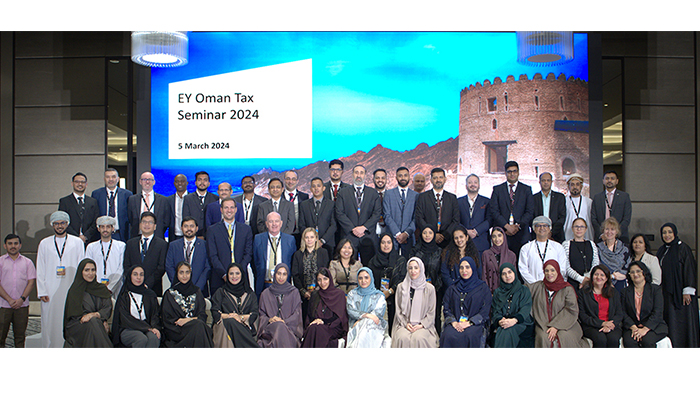
Muscat: EY Oman hosted its Annual Tax Seminar 2024 in Muscat helping businesses navigate the evolving tax landscape in the country and the Mena region. The tax and regulatory landscape in Oman and the wider Mena region continues to evolve alongside global fiscal developments.
The seminar had the participation of around 180 C-suite executives and finance professionals from Oman-based companies as well as representatives of several multi-national corporations. EY regional tax leaders discussed how the future of tax is being reshaped and the growing significance of tax in the Mena region.
Areas of discussion included the Oman Tax developments, base erosion and profit shifting (BEPS) and what is expected from business to comply with transfer pricing and BEPS 2.0 rules. Environment, Social and Governance (ESG) and Sustainability tax development conversations leveraged the knowledge and practical experience of EY’s senior tax professionals to offer comprehensive insights. Updates on indirect taxes, e-invoicing and the ongoing digitalisation of tax compliance by the Oman Tax Authority with a focus on the e-filing of returns on its portal.
In addition, the sessions explored the state of the country’s economy and the opportunities it presents to companies and investors, as well as international tax reforms and their impact on the local tax environment.
Taxation has emerged as an important revenue generator for Oman’s government, accounting for around 15% of the national GDP. In comparison, the largest contributor — the oil and gas sector — represents 70% of the GDP. Oman currently has three main tax streams in place — excise tax, value-added tax (VAT) and corporate tax, including withholding tax.
Ahmed Al-Esry, EY Mena Tax Leader, says: “In line with its drive to adopt the latest technologies, the Oman Tax Authority is striving to digitalise taxation. This has resulted in a shift toward electronic interaction with taxpayers, paperless assessments, more thorough data analytics based on detailed information requests and shorter assessment timelines. Businesses will be expected to have more transparent record retention, which will enable them to engage with the tax authorities in a more meaningful way. Therefore, digital readiness will become crucial going forward.”
The seminar further examined regulatory updates and recent tax trends across the Mena region with a focus on the GCC, which affects Omani businesses operating in other jurisdictions. These included the implementation of corporate income tax (CIT) in the UAE and Bahrain, the introduction of e-invoicing in Saudi Arabia and major amendments to the tax law in Kuwait.
The rising importance of ESG agendas in connection with tax was highlighted, with a deeper look at potential incentives and carbon credits for companies that are pursuing environment- and climate-friendly strategies.
Alkesh Joshi, EY Oman Tax Leader and EY Mena Sustainability Tax Leader says: “The introduction of new carbon measures across the globe as far as goods movement is concerned will require products which are entering EU markets and other large trading countries to be below a certain threshold of carbon emissions. To create a level playing field, we anticipate that most of the GCC countries will look to introduce some form of a carbon emission taxation system, which will allow them to compensate for this. Energy and manufacturing companies must keep up to date with the latest developments in this space to give themselves a head start in preparing for this upcoming change.”